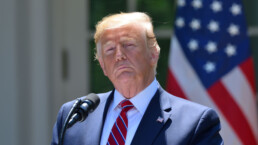From trade wars to border policy, Trump’s plans if he wins the presidency again are set to make the U.S. economy far worse for working people.
by Max B. Sawicky, In These Times
What could we have to look forward to, or dread, in economic policy if Donald Trump returns to the White House in 2025?
The challenge here is separating whatever might germinate in his brain or that of his advisers and which long-standing priorities of the Republican Party remain. We saw the difference between 2017 and 2020. In important cases, Trump deferred to then-Senate Majority Leader Mitch McConnell (R-Ky.) and the Republicans in Congress. He swallowed their prescriptions on judicial appointments, and he helped push through a bill to cut taxes, primarily benefiting the rich and corporations. But in other ways he left the reservation.
The most obvious deviation was his rhetoric about trade deficits, which I am convinced he could never define correctly. (In national income accounting, it’s the excess of imports over exports.) It may sound bad, though it isn’t necessarily.

In any case, we did get very real tariffs. The Trump rhetoric on trade was appealing to manufacturing workers clobbered by outsourcing. Even a progressive hero like Sen. Sherrod Brown (D-Ohio) ended up embracing Trump’s move to impose tariffs on steel. The Biden Administration itself has declined to reverse all of Trump’s tariffs from his first term.
Simply put, a tariff is a sales tax confined to imports. To say the Chinese “paid” the tariff is a non sequitur, like saying the supermarket pays the sales tax. That makes it more ridiculous for supporters of tariffs to complain about inflation. Like sales taxes, a tariff pushes up the gross prices that you as the consumer pay. The seller who collects the tax (the importer, or the supermarket) simply hands it over to the government.
Recent Posts
“Arrest Now, Ask Questions Later”: Why Did L.A. ICE Agents Arrest and Jail U.S. Citizen Andrea Velez?
July 3, 2025
Take Action Now “They didn’t have vests that said ICE or anything. Their cars didn’t have license plates. … Just because of the color of our…
Trump’s Big, Beautiful Bill Is Naked Class War
July 3, 2025
Take Action Now Trump’s “Big, Beautiful Bill” trades tax cuts on millionaires for the dissolution of society.By Hamilton Nolan, In These Times…
Mayor Mamdani’s First Day, A Zero Hour Conversation With Richard Wolff
July 2, 2025
Take Action Now If elected, what would Mayor Mamdani do on his first day in City Hall? How would a democratic socialist govern as a big-city mayor?……
The U.S. Is Funding A Bloodbath At Gaza Aid Centers
July 2, 2025
Take Action Now The admin just gave $30M to GHF, the organization at the center of charges that Israel is weaponizing assistance and shooting at…




